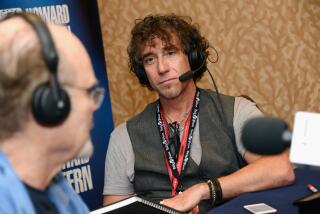Stern’s Healthy Take on Miscarriage
- Share via
In Print: “Private Parts” (Simon & Schuster, 1993), the best-selling memoir by radio personality Howard Stern.
Family Portrait: Although Stern has a randy radio persona, he has been married for 16 years to his college sweetheart, Alison. They have three daughters.
Back Story: In “Private Parts,” Stern describes how badly he and Alison wanted children. But in 1982, six weeks into her first pregnancy, Alison had a miscarriage.
Fuse Time: “Private Parts” recounts the show in which Stern announced the miscarriage and reacted to the loss of the baby. The voice of “God” is heard, deriding Stern for being “half a man.”
Stern rages at the possible causes of the miscarriage, blaming his wife, himself or his experiments with LSD during college. Then he tells listeners he and Alison have named the embryo and plan to “take him to the zoo next weekend.”
Telling Quote: Stern, on the air: “My kid’s gone. And with him all my dreams and fantasies.”
Ground Zero: After the segment, the phone lines were flooded with calls. But the person most shocked wasn’t even a listener. It was Alison Stern, who had no idea that her miscarriage had become radio fodder until a reporter called her. At first, she writes in “Private Parts,” she was mortified and furious. But she forgave Stern. “I could never stay mad at Howard. I understood (that what he did) wasn’t so horrible.”
Prescription Pad: His comments might even have been healthy, said Dr. Elaine Rodino, a psychologist who practices in Santa Monica. What Stern blurted to the world is what many men and women feel in their hearts when they suffer a miscarriage. Stern’s outpourings were therapeutic--not only for him, but for some people in his audience, she said.
“In exposing his anguish and horror and guilt and fear and sadness on the air, he was telling people it was OK to feel all these things--including the mentally sick-sounding feelings,” she said. “It makes it better for people to know events like a miscarriage can prompt these feelings.”
Even the notion of taking the embryo to the zoo conveyed a common wish, albeit in an uncommon way, Rodino said: “It’s part of his unique, creative, weird thinking, but the idea is that people want to make that baby alive again.”
* Media Monitor examines the family issues raised in current films, books and television shows. It appears regularly on the ‘90s Family page.
More to Read
Sign up for our Book Club newsletter
Get the latest news, events and more from the Los Angeles Times Book Club, and help us get L.A. reading and talking.
You may occasionally receive promotional content from the Los Angeles Times.








